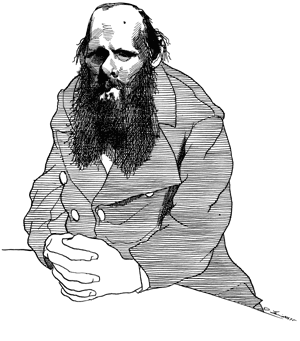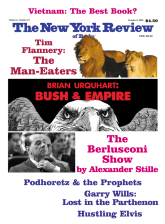To the Editors:
I am grateful to Professor Aileen Kelly for her article on the fifth and final volume of my books about Dostoevsky’s life and work [NYR, March 27]. As an admirer of her own writings on Russian literature, I am all the more gratified by her praise. Her critical remarks, however, touch on substantive issues of considerable importance regarding Dostoevsky, and are well worth discussing quite aside from my own self-defense.
Professor Kelly agrees that “Frank pulls no punches in conveying the nastiness of Dostoevsky’s anti-Semitism and the tedious jingoism of his ‘Russian idea'” as exhibited in his Diary of a Writer. But she faults me for not taking seriously enough the connection between the millenarian fantasies of his apocalyptic politics and his anti-Semitism. Drawing on Norman Cohn’s great The Pursuit of the Millennium, she points out that in the Middle Ages such fantasies were linked with the most savage pogroms. In my case, however, I viewed the “grandiose predictions” of his dreams of a Russian world order, poisonously accompanied with anti-Semitism, as a “means of rescuing himself from despair as his country lurched from crisis to crisis” during the 1870s, thus giving it too narrow a significance.
Kelly believes that his anti-Semitism flowed intrinsically from his perfervid political millenarianism. Such millenarianism had already made its appearance during the 1860s, when he contrasted European society, riven by class conflicts, with a vision of Russia—and especially the Russian people—as endowed with the God-given task of creating a world of universal justice and harmony. Such millenarianism, in fact, was everywhere in the Russian culture of the time (Alexander Herzen included). But there is no anti-Semitism whatever in any of Dostoevsky’s earlier articles. Why should it have surfaced so conspicuously only in the 1870s? This was the question I tried to answer.
How seriously and literally are we to take Dostoevsky’s millenarian prognostications? Kelly rejects my view that for Dostoevsky the notion of a Kingdom of God on earth “presumably remained speculative and transcendent.” She admits that he was “uneasy about the attempt to reconcile the rival ideas of the Kingdom of Heaven and an earthly paradise”; and she conscientiously refers to my analysis of The Idiot in a previous volume (No. 4), where the impossibility for Prince Myshkin to live in the world by the highest Christian ideals reveals the unbridgeable disparity between the realms of earth and heaven. But she prefers to disregard such evidence—though the testimony of art should be more compelling than any other—and refers to Dostoevsky’s interest in two thinkers (Nikolay Fyodorov and Vladimir Solovyov) to support an opposite conclusion.
The first considered the task of mankind to be the material resurrection of the fathers by their sons in some mysterious science-fiction fashion. How one can consider such an idea to be anything but “speculative and transcendent” escapes me. Vladimir Solovyov is a more serious matter, and Dostoevsky was certainly attracted to his definition of “Russia’s mission as [bringing about] the establishment of a theocratic Kingdom of God on earth.” Kelly maintains that such a Kingdom in The Brothers Karamazov is seen as completely terrestrial, and refers to the discourses of Dostoevsky’s spokesman Father Zosima as “hold[ing] out the promise of paradise as an imminent earthly prospect—a state of total harmony.”
But Father Zosima, commenting on Ivan Karamazov’s advocacy of Solovyov’s theocratic ideal of the state turning into a church, does not accept this prospect as more than a visionary hope. For him, it is “ordained to come to pass,” but only “at the end of the ages” (italics added), which of course may be tomorrow. Christianity teaches that many other extraordinary events are also ordained to occur at “the end of the ages,” for example, the Second Coming and the resurrection of the dead (though these are not referred to here). What will take place only at “the end of the ages” surely cannot be considered “an imminent earthly prospect”; nor would the word “earthly” retain its ordinary meaning in such a context.
Kelly also considers me “mistaken” in remarking that “the passions aroused by the Russo-Turkish War” had brought Dostoevsky closer to identifying religion with nationality than in the past. For her, this identification was not due “to the political contingencies of the mid-1870s but to Dostoevsky’s lifelong adherence to two ideas at once,” that is, a supernatural universal religion on the one hand and a deep-rooted Russian nationalism on the other. Oddly enough, she herself cites the chapter in The Possessed (1871–1872) in which Shatov, who considers the Russians to be a “Godbearing people,” admits that he does not yet believe in God—though he is striving to do so. Stavrogin therefore accuses him of reducing God to a “mere attribute of nationality,” thus subordinating divinity to purely earthly concerns. However, nine years later Father Zosima declares in The Brothers Karamazov (1879–1880) that “whoever does not believe in God is not going to believe in God’s people.” Religion and nationality are brought much closer together here by Dostoevsky’s spokesman; the two seem to have become identical, and I do not believe I am “mistaken” in pointing this out.
Advertisement
I am, however, in complete sympathy with Kelly’s castigation of the unfortunate influence that some sections of Dostoevsky’s Diary of a Writer have exercised on a number of the most obnoxious political movements of the past and present. But the justified revulsion aroused by this usage should not unduly color the actual trajectory of his life and the significance of his works. These dramatize the profoundest issues of Judeo-Christian culture, and are infused with a tragic human dimension that raises them far above the level of social-political polemic.
Joseph Frank
Stanford, California
Aileen Kelly replies:
It is unfortunate that I have given Joseph Frank the impression that by insisting that Dostoevsky’s messianic nationalism must be taken seriously as a component of his vision of the world, I am seeking to water down the image (conveyed so compellingly in Frank’s five volumes) of Dostoevsky as a great defender of freedom against the encroachments of utopian ideologies. That was not my intention.
He sees me as reluctantly “admitting” Dostoevsky’s doubts about the possibility of an earthly paradise, and regards it as “odd” that I should further undermine my case against him by citing his devastating passage on religious nationalism in The Possessed. This would indeed by puzzling if my argument were not based on the notion of “Two Dostoevskys”: his notebooks and novels provide abundant evidence of a continuous inner dialogue on the possibility of a perfected human community—a struggle that was at least as agonized and as unresolved as those of the great seekers of his fiction. I regard the impact of the novel’s dramatization of the dangers and delusions of utopian thought as in no way diminished by their author’s inconsistency when he makes an exception for his own millenarian hopes.
Why, then, take these hopes seriously? Because the “other” Dostoevsky preached them with such infectious conviction.
Frank believes that I overemphasize this aspect of his thought. Such millenarianism “was everywhere in the Russian culture of the time.” I presume he is referring to the conservative utopianism of the Slavophiles, and the radical intelligentsia’s faith in the power of reason and socialist doctrines to transform human societies. But millenarianism in the classical sense—belief in imminent, miraculous, terrestrial salvation as the predestined culmination of history—was a much rarer phenomenon of the time, and Dostoevsky undoubtedly became its most influential proponent. Frank cites Alexander Herzen, the father of Russian socialism, as an instance of the same phenomenon. But there is no genuine comparison between Herzen’s hope that the Russian peasant commune could be developed along socialist lines with the help of Western science and social theory (more a question of experimental social engineering than an example of the classical features of millenarianism) and Dostoevsky’s belief, expressed in ever more extravagant terms from the mid-1850s, that the Russian people had a historical mission to bring about a reconciliation of all European nations in a new Christian world order. In retrospect, Herzen’s hopes may have been utopian, but he was consistently anti-millenarian in his defense of the freedom and unpredictability of the human spirit against all forms of the belief that the historical process was leading to an imminent and predestined earthly salvation. Even socialism, he famously suggested, would one day come to be rejected as an outworn creed. Dostoevsky’s reading of Herzen is said to have influenced his assault on historical determinism in Notes from Underground: but by then the other Dostoevsky had already begun preaching the predestined mission of the Orthodox Russian people to bring about Europe’s rebirth.
Frank believes I am wrong to take such prognostications literally as an earthly hope, citing Father Zosima’s comment that the Kingdom of God on earth will come to pass, “but only at the end of the ages.” But millenarian thinking stresses the imminence of this final transformation: Zosima also suggests “we may have already reached the eve of its appearance”—a view that Dostoevsky expressed repeatedly in his notebooks and Writer’s Diary of the mid-1870s, interpreting the Russo-Turkish conflict as the cataclysm from which this will emerge: “Now, for everyone in the world, ‘the time is at hand.'” “The full Kingdom of Christ…will come to pass and it will be with us in Russia, perhaps sooner than anywhere else.” Frank maintains that comments such as these do not refer to anything “earthly” in the ordinary meaning of the word. But if this is the case, what is the meaning? And then why, in his more self-questioning moods, does Dostoevsky express the fear that his vision of the transformation of the terrestrial world is incompatible with the Christian doctrine of the heavenly Kingdom of God?
Advertisement
Frank also finds it curious that I ascribe a literal meaning to the theories of Fyodorov, whose notion of an earthly paradise created by humans themselves so impressed Dostoevsky. He seems to be saying that because such visions are contrary to experience and common sense (a point on which we both agree), their proponents cannot have meant them literally. Surely this is no more true of Dostoevsky than it is of Marx, who was certainly not speaking of some transcendent world when he announced communism to be the answer to the riddle of history: “the true solution of the conflict between existence and essence…between freedom and necessity, between the individual and species.”
Despite its dubious intellectual and moral credentials, Dostoevsky’s messianism, like Marx’s, must be taken seriously because of its effects in practice. Both varieties are deeply dangerous, lending themselves to the demonization of all those who are not seen as the chosen vehicles of history’s movement to earthly salvation, such as the “enemies of the people” who were the objects of Stalin’s Terror, or the Jews, the perennial scapegoats of Christian millenarianism. Although as Frank points out, Dostoevsky’s anti-Semitism surfaced only in the 1870s, it flowed logically from his messianic nationalism. The role of Jewish financiers in the development of Russian capitalism was sufficient to make him resort to traditional clichés and to depict the Jews as the most menacing embodiment of the materialism that he believed to dominate Western culture and threaten the universal reign of the “Russian idea.” A similar mixture of anti-Semitism and anti-Westernism is now observable on the contemporary Russian far right.
In summary, Frank believes that my insistence on Dostoevsky’s messianic nationalism distorts “the actual trajectory of his life.” But, as I wrote in my review article, entitled “The Two Dostoevskys,” I am unable to accept the view that Dostoevsky’s life followed by a single path. The evidence fits better with Tolstoy’s description of him as “a man who was all struggle.”
This Issue
October 9, 2003




